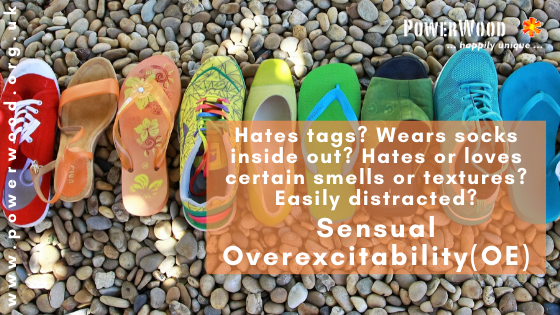
Exploring OverExcitability – E-Book FREE when a member, read about:
- How having OE might affect yourself and/or your child.
- Where this behaviour stems from.
- How it can be misdiagnosed.
- What the strengths are of having Overexcitability.
Sensual OE
 Children and adults with a sensual OE can be overwhelmed by what they see, hear, smell, taste and touch. They may get extreme pleasure from or hate certain foods, textures and smells etc. They might dislike tags in their clothes or want to wear their socks inside out to prevent feeling the seams. Children might want to touch people at inappropriate moments or may be unable to cope with being touched themselves.
Children and adults with a sensual OE can be overwhelmed by what they see, hear, smell, taste and touch. They may get extreme pleasure from or hate certain foods, textures and smells etc. They might dislike tags in their clothes or want to wear their socks inside out to prevent feeling the seams. Children might want to touch people at inappropriate moments or may be unable to cope with being touched themselves.
Distracting
This OE can be highly distracting. These people may have difficulty concentrating when a lamp is flickering, or when certain music is playing and can become overwhelmed by noise and busy places. The opposite can also be true, resulting in the need for a certain stimulus, such as music, to be able to concentrate.
“My son hated shoes and always managed to sneakily leave them at petrol stations when we were on long journeys – he knew we wouldn’t discover they were missing until the next stop and that we wouldn’t go back for them. He would then have a chance of being without shoes for a few days.” Simone about her son
When experiencing emotional tension this OE can be expressed in the desire to be the centre of attention, sexual overindulgence, buying sprees and an inclination to develop eating disorders or addictions. Children are often seen as overreacting when they try to avoid overstimulation and seek soothing experiences. This sensitivity can be mistaken for a characteristic of Autistic Spectrum Disorder.
“The girl (one and a half years old) touched wet sand in the playground. Her eyes looked at her hands with such a disgust and she started screaming as if she had been bitten.” Observation by Simone
Sensual OE is positive because it offers a greater enjoyment of life. This heightened ability allows art, music, nature, beautiful objects, the lyrics of a song or a poem, food and drinks to be enjoyed on a completely different level.
Read more about the other areas of intensity: Psychomotor, Intellectual, Imaginational and Emotional.
PowerWood’s Community
Find understanding, tools and strategies that work in an understanding, respectful and compassionate Community.
PowerWood can be your and your families advocate and your second family.
Explore how joining our PowerWood community by becoming a member will benefit you and your family and what types of memberships are available.
Join our Community
Available to Members*
*Booking a one-off Free Introductory Talk of 45-60 minutes by Skype or FaceTime with Senior Consultant Simone de Hoogh is one of the benefits of being either a FreeBee PowerWood Community Member or a Friend PowerWood Community Member.
Book a FREE Introductory Talk with a Professional*
You can read more about PowerWood’s Consultancy Sessions, the Benefits of a Free Introductory Talk and PowerWood’s Consultancy Services Tiered Fee Structure.
*Overexcitability Test
OE (Overexcitability) is an element of a Developmental Theory –Theory of Positive Disintegration by Dabrowski- that is one of the underpinning theories of MERT (Multi-level Emotion Regulation Theory) developed by Simone de Hoogh. Overexcitability explains and allows us to look at ‘extreme’ behaviour as a valuable asset in our or our children’s life.
Find out if you or your child has OE (OverExcitability) as well
*Boundary Test
A HUGE thank YOU to the son and daughter of Ernest Hartmann’s who gave PowerWood permission to use and put the full academically approved questionnaire about the Boundary in the Mind on PowerWood’s website.
Find out how the Boundary in the Mind affects you or your child
Further Reading
UK
Lucinda Leo’s Blog: What is Sensual Overexcitability?
USA
Jade Ann Rivera: How to identify and cope with overexcitabilities, part 5 of 5: Sensual overexcitability
My Little Poppies: Sensory STUFF (Overexcitabilities, intensities, SPD, ADHD, anxiety, behaviour… call it what you will)
Living with Intensity, Book edited by Daniels and Piechowski
